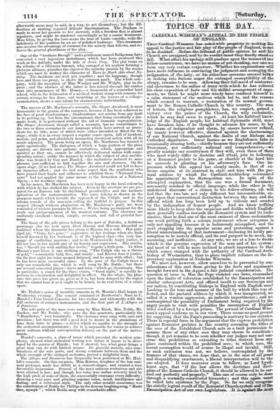The success of Mr. Macfarren's serenata, The Sleeper Awakened, is
moat honourable to the genius of the composer, because it has been achievedin the face of great disadvantages ; disadvantages not arising from any fault in its getting-up, but from the circumstance that being essentially a dra- matic work, it is performed without the aid of dramatic representation. .27w• Sleeper Awakened, though called a serenata, has no resemblance to the two or three serenatas in our language which have served as -prece- dents for its -title, none of Which were either intended, or fitted for 'the stage ; while it is in every respect a regular comic opera, full of incident, motion, endpoint, and absolutely demanding theatrical action with all its scenic adjuncts. 'The poem being an opera, Mr. Macfarren has treated it quite operatically. The dialogues, of which a large portion of the piece consists, are thrown into parlante recitatives, which, appropriate and spirited as they are, cannot be effectively delivered unless with corre- sponding action; unlike the,manner in which the subject of Acis And Ga- latea was treated by Gay and Handel,—the recitatives reduced to mere phrases, just sufficient to 'link together the airs and choruses. On the opera stage, (if we had one,) The Sleeper Awakened could not fail to have an immense effect ; and we feel some regret that the gentlemen who have joined their funds and influence to establish these "'National Con- certs" had not applied the same means to the formation of .a 'National Opera—a far worthier object. In his music, Mr. Macfarren has been very happy in the local colouring with which he has clothed his subject. Even in the overture we are pre- pared for an Eastern tale by rhythmical peculiarities and the barbaric splendour •of the instrumentation. The same felicity is shown in the pompous march which heralds the approach of the Caliph, and in the solemn sounds of the muezzin calling the faithful to prayer. in.this respect (though without plagiarism on Mr. Macfarren's part) we were reminded of various passages in -Oberon ; 'Weber being preeminent for the truth and picturesqueness of his musical costume. The choruses are uniformly excellent—broad, simple, resonant, and full of grateful har- mony.
The finest of the solo pieces belong to the part of Zuleika, a fictitious personage (for we look upon Abon Hassan and Haroun Alraschid as realities) whom the dramatist has given to Hassan for a wife. Her prin- cipal air, " Gone, he's gone !" expressive of her feelings when she finds herself deserted by her husband, is of the highest class—the very 'lan- guage of conflicting passions ; and to do Mademoiselle Angri justice, it did not lose in her mouth any of its beauty and expression. Her arietta, too, " Should joy with smiling face invite," is quite a little gem. In Abon Hassan's part there is one striking song, "The Caliph sits on a throne of gold,"—remarkably bold, free, and manly ; and Reeves does it justice. On the first night his voice seemed fatigued, and he sang with effort ; but he has been more successful since. In the part of the Caliph there is only one remarkable air, which is well sung by Mr. Bodda ; but there are severalconcerted pieces—duets and trios—which go charmingly. One in particular, a canon for the three voices, " Good night," is equally in- genious in construction and delightful in effect. On the whole, the plea- sure this piece has given us, great as it is, has been damped by the regret that we cannot hear it as it ought to be heard, in its real form of 'a comic opera.


























 Previous page
Previous page